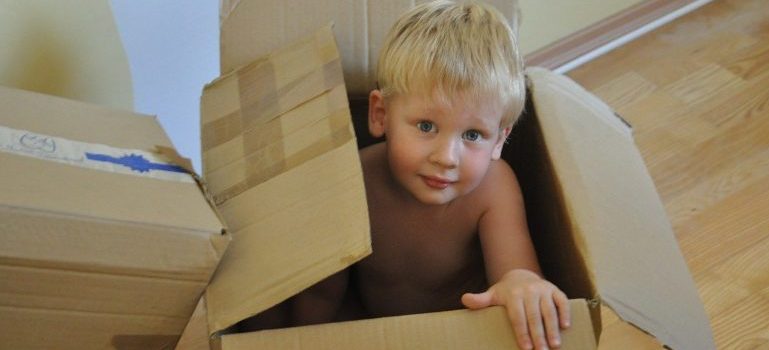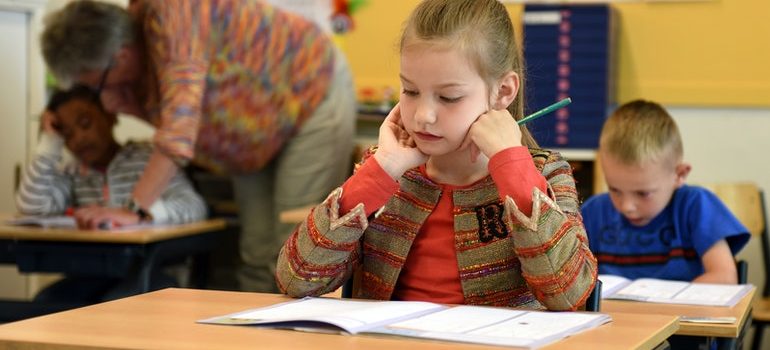How to Help Your Kids Adapt to New Surroundings
Relocating often represents a fresh chapter in a family’s life, but for children, it can also feel like leaving everything familiar behind. Moving to a new home brings changes to routines, surroundings, and friendships, which can be overwhelming for kids. As a parent, you don’t need to just manage logistics but help your kids adapt to new surroundings, provide emotional support, and create a sense of stability. With thoughtful planning and a proactive approach, your family can turn this transition into an opportunity for growth and stronger bonds. Our team from one of the longest-standing Idaho moving companies will tell you how.
Preparing Your Kids Before the Move
Preparing children before a move is essential for easing anxiety and fostering excitement. Open communication, careful planning, and emotional validation set the tone for a smoother transition.
Open Communication
Honest conversations about the move can help children feel included and valued. Start by explaining why the move is happening in a way that aligns with their age and understanding. Younger kids may need a simplified explanation, while older children might want to know more details about the reasons behind the decision.
Encouraging questions is key to reducing uncertainty. Address concerns such as making new friends, adjusting to a new school, or missing old hangouts. Providing clear answers shows that their worries are valid and that you are there to support them through the changes.

Involving Kids in Planning
Including children in planning activities helps them feel connected to the process. Small choices, like picking paint colors for their new room or deciding on family activities in the new area, give them a sense of control. If possible, take them to visit the new neighborhood or show them pictures and videos to build familiarity. Highlight exciting aspects of the new environment. Talk about nearby parks, fun activities, or local attractions that might capture their interest. These discussions help reframe the move as a positive experience.
Acknowledging Their Feelings
Everybody can experience a mix of emotions when faced with the need to book moving services in Boise ID. Children, for example, may feel sad about leaving friends, while others might be nervous about starting at a new school. Acknowledging their feelings without dismissing them is crucial. Reassure them that it’s okay to feel upset or scared, and share your own feelings about the move. Expressing vulnerability creates a safe space for them to do the same.
Helping Them Say Goodbye
Leaving familiar surroundings can be an emotional experience. Helping children say goodbye to their old environment and connections in a meaningful way ensures closure and paves the way for new beginnings.
Planning Farewell Activities
Goodbye activities, such as hosting a small gathering with friends and neighbors, allow children to celebrate the memories they’ve made. Simple ideas like making a scrapbook or writing notes to friends provide tangible keepsakes they can hold onto. These activities emphasize the importance of cherishing the past while looking forward to the future. Farewell activities don’t need to be elaborate. A shared pizza night with friends or a photo session at a favorite park can create lasting memories. The goal is to leave with a sense of gratitude and happiness rather than regret.
Maintaining Connections
Strong friendships don’t have to end with the move. Setting up ways for kids to stay in touch with old friends eases the feeling of loss. Video calls, letters, and social media (if age-appropriate) help maintain those bonds. Encourage children to schedule regular calls with their friends or exchange letters and pictures. Building bridges between the old and new chapters of their life ensures they feel supported as they adjust to unfamiliar surroundings.
Setting Up the New Home
Creating a comfortable and familiar environment in the new home is vital to help your kids adapt to new surroundings and settle in more easily. Small details can make a big difference in how they perceive their new surroundings.
Prioritizing Their Comfort
Making the child’s bedroom a priority during unpacking helps them feel at home. Arrange their room with their input, so they feel involved in the process. A space that feels uniquely theirs is a safe haven during the transition. Even small touches, like setting up their bookshelf or adding their artwork to the walls, make a significant impact.

Creating Family Spaces
Shared spaces are equally important in fostering a sense of belonging. Organizing the living room or kitchen with the family’s routines in mind promotes togetherness. These areas become the heart of the home, where family members connect and recharge. Family movie nights, board games, or simple conversations in these spaces provide reassurance and strengthen bonds during the adjustment period.
Establishing Routines Quickly
Children thrive on predictability. Maintaining consistent routines for meals, bedtime, and other daily activities restores a sense of normalcy. Even amidst unpacking your moving boxes in Boise, finding time for familiar rituals like bedtime stories or weekend outings helps stabilize their emotions. Consistency reinforces that life continues despite the changes. Kids are more likely to adapt when they know what to expect each day.
Exploring the New Surroundings
Getting to know the new neighborhood turns a daunting move into an exciting adventure. Exploring together helps children feel more confident and connected to their environment.
Taking a Tour
Walking around the neighborhood as a family will help your kids adapt to new surroundings faster and ore easily. Point out local landmarks, parks, or shops that might interest them. Visiting their new school before the first day can ease nerves and build familiarity. Emphasize fun aspects, such as nearby ice cream shops, playgrounds, or sports fields. Exploration transforms the new area from an unknown place into an inviting space.
Connecting with Local Families
Building relationships within the community benefits both children and parents. Local events, parent groups, and extracurricular activities are excellent opportunities to meet families with similar interests. Community connections provide a support system and a sense of belonging. For children, these new friendships make settling in more enjoyable and less intimidating.
Highlighting Exciting Opportunities
The move can open doors to experiences they didn’t have before. Perhaps the new location offers classes, sports, or activities that weren’t available previously. Encouraging them to explore these opportunities will help your kids adapt to new surroundings and focus on the positives of their new home.
Consider suggesting activities like:
- Signing up for a new sport or hobby, such as swimming, martial arts, or dance.
- Joining community programs like art classes, theater groups, or coding workshops.
- Exploring nature through local hiking trails, parks, or nature clubs.
- Participating in neighborhood or school clubs tailored to their interests.
- Volunteering for a cause they care about to build confidence and meet others.
Maintaining old hobbies while introducing new ones creates balance. Your children will learn to embrace change while preserving their sense of identity.

Building New Social Connections
Adjusting to a new community after moving to Idaho involves building relationships and feeling part of a social network. Supporting children as they navigate new friendships and routines can significantly impact their overall adjustment.
Supporting School Adjustments
Starting at a new school often feels overwhelming for children. Meeting teachers and classmates ahead of time can ease this transition. Communicate with school staff about your child’s needs and ask for their help in making introductions to peers or finding extracurricular activities that align with your child’s interests. Encourage your child to participate in clubs, sports, or art classes.
Fostering Friendships
Helping children make new friends doesn’t need to be complicated. Simple actions, like arranging playdates or introducing them to neighbors with kids, create opportunities for connections. For older children, encouraging group activities like gaming or sports can spark camaraderie. Building friendships takes time, and it’s essential to remind your kids that forming strong bonds doesn’t happen overnight. Show patience and encourage small steps forward.
Dealing with Challenges
Every move comes with challenges, but addressing them proactively makes adapting easier for children. Emotional support and practical strategies are key to overcoming obstacles.
Addressing Homesickness
Children often experience homesickness when they miss the familiarity of their old environment. Encourage them to express their feelings openly and validate their emotions. Sharing family photos or creating a memory board of their previous home can provide comfort.
Some children may find it helpful to:
- Stay in touch with old friends through letters or video calls.
- Keep a journal to express their thoughts and emotions.
- Engage in activities they enjoyed in their old community to bring a sense of familiarity.
Offering these practical options allows them to find comfort in both old and new routines. Parents should check in frequently to ensure the strategies are working and adapt as needed.
Being Patient
Adapting to change is a process, and each child responds differently. Some adjust quickly, while others may take weeks or months to feel at home. Celebrate small achievements, such as making a new friend or joining a class activity, to motivate and reassure them. Parents should focus on providing consistent love and support without pressuring their children to “move on” too quickly. Over time, most children will find their footing and feel secure in their new surroundings.
Encouraging Long-Term Positivity
Once the initial transition is over, creating a forward-looking perspective ensures that children see the move as a positive step in their lives. A resilient mindset helps them embrace new opportunities while staying grounded.
Creating a Vision for the Future
Talk with your kids about what they hope to accomplish or experience in their new home. Setting small, achievable goals—like joining a new activity or excelling in a school subject—gives them something to look forward to. Encourage them to take pride in their accomplishments, no matter how small. Highlighting their ability to adapt reinforces self-confidence and makes future challenges seem less daunting.

Celebrating Achievements
Marking milestones during the adjustment period creates a sense of progress. Whether it’s successfully completing the first week at a new school or joining a local soccer team, celebrating achievements reinforces their resilience and motivates them to keep trying.
Here are a few ideas for meaningful ways to celebrate milestones with your little ones:
- Plan a special family outing, like visiting a local attraction or park.
- Let them pick their favorite meal for dinner or bake a celebratory treat together.
- Create a small reward system, such as stickers or tokens for each milestone reached.
- Write them a note or card praising their efforts and accomplishments.
- Host a movie or game night dedicated to their achievements.
Family traditions, like a special dinner or movie night, can make these celebrations even more meaningful. Don’t forget that even small acts of recognition remind kids that their efforts are noticed and appreciated.
Teaching Resilience
Resilience is an invaluable life skill that helps children navigate the complexities of change. Viewing relocation as an opportunity for personal growth teaches them to adapt to other challenges they may face in the future. Share examples of times when you faced change and how you managed it. These stories can inspire and encourage them to build their resilience.
Building Stronger Family Bonds Through Change
Adapting to a new environment is rarely easy for children, but it’s also an opportunity to grow as a family. Thoughtful preparation including childproofing your new home, emotional support, and proactive involvement will help your kids adapt to new surroundings and make the process smoother and more positive. Helping kids say goodbye to their old home, fostering connections in their new surroundings, and teaching resilience create a foundation for long-term success. With patience and care, you can turn your upcoming relocation into a meaningful chapter in their lives.

Everyone from the packers to the movers were awesome! They were all very professional and showed up when they were supposed to. would definitely use them again.

